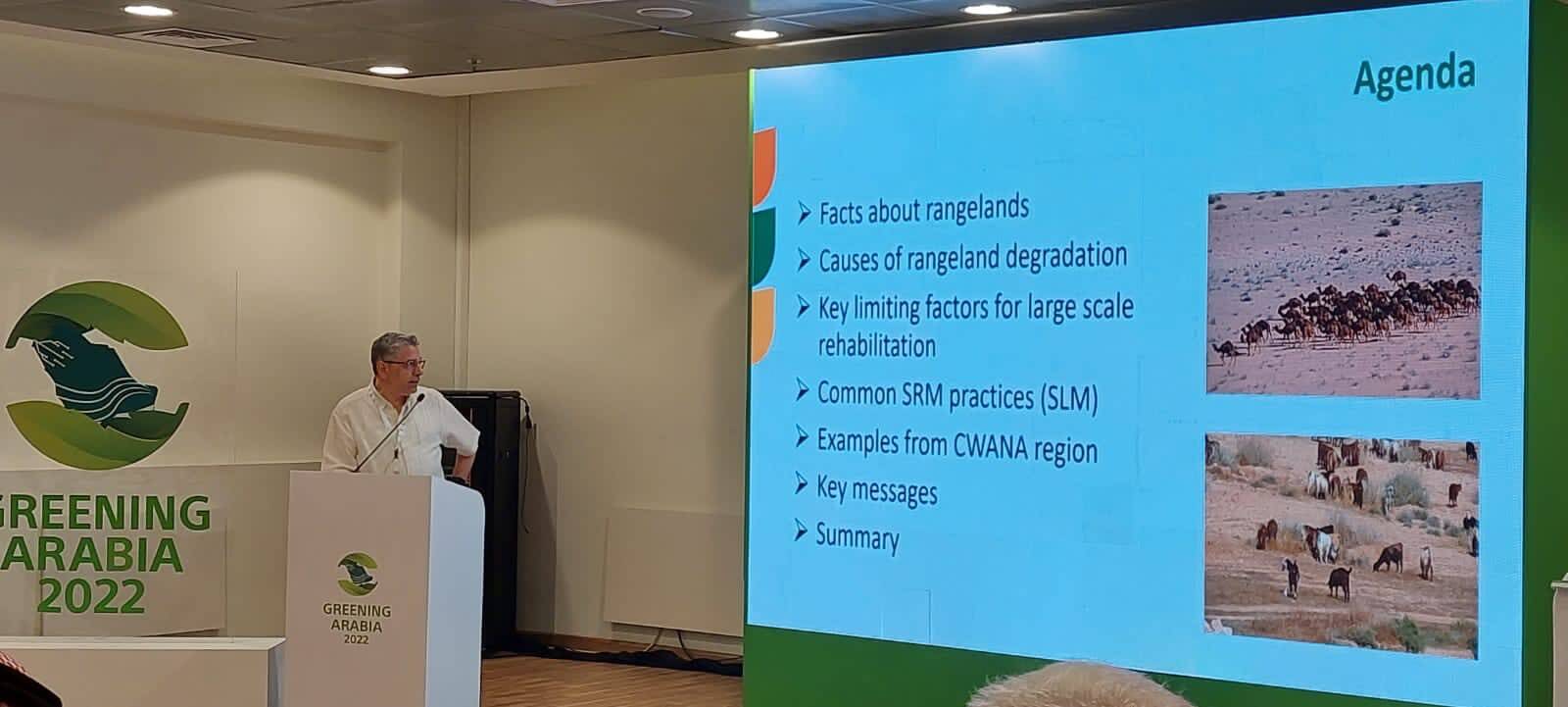ICARDA at the International Exhibition and Forum on Afforestation Technologies

Riyadh, Saudi Arabia – last May, Dr. Mounir Louhaichi, ICARDA's Research Team Leader of Rangeland Ecology and Forages, addressed the International Exhibition and Forum for Afforestation Techniques, organized by Saudi Arabia's National Center for the Development of Vegetation Cover and Combating Desertification (NCVCCD) in collaboration with the Ministry of Environment, Water and Agriculture (MoEWA).
The exhibition and the accompanying forum raise awareness of the increasing loss of vegetation cover in the region, which is vital for combating desertification and addressing climate change challenges in Saudi Arabia and the Middle East. NCVCCD urged government agencies, semi-governmental organizations, companies, and non-profit organizations to become active stakeholders in projects that can rehabilitate land areas and slow down or even halt desertification. The forum is an opportunity for national and international organizations and companies to present the latest developments, technologies, and innovations, in vegetation cover development and conservation.
With more than 25 years of experience in rangeland ecology and management, Dr. Louhaichi presented research and innovation for sustainable large-scale rangeland rehabilitation that includes:
- Understanding the leading causes of rangeland degradation in the region. For example, planting trees or cultivating cereals such as barley on rangelands can damage the land and cause biodiversity loss. Or how the prevalent mode of continuous grazing damage rangelands, compared to traditional grazing systems, based on the traveling herds’ mobility that allow vegetation recovery between grazing events.
- Highlighting bottlenecks for large-scale rangeland restoration and rehabilitation, such as a lack of solid rangeland governance which is a key factor in achieving sustainable use of rangelands. In addition, the availability of well-adapted seeds and seedlings of native pastoral species that can thrive in the harsh climate are insufficient to cover the vast area identified for rehabilitation. These aspects are addressed in the CGIAR’s Livestock, Climate and System Resilience (LCSR) initiative.
- Raising awareness of essential rangeland rehabilitation practices such as breaking the soil surface crust by using shallow soil scarification, rainwater harvesting, reseeding of indigenous species, and proper grazing management, rather than intensive methods such as plowing and flood irrigation.

Dr. Louhaichi also presented three case studies from ICARDA's research for development carried out alongside its partners in the CWANA region, including the rehabilitation of the Jordanian Badia and the sustainable development of a silvopasture pilot site in central Tunisia.
Dr. Louhaichi explained that rangeland degradation occurred over many centuries, and reversing the damage will be a long haul. However, he emphasized that the key to sustained rehabilitation is understanding how ecosystems function in particular technical, cultural, and social contexts using proven and evidence-based solutions accepted by local communities and having patience. He provided vital recommendations and stressed that interventions should be context-specific, and thorough diagnoses of the rangeland degradation root causes should take place before taking any action.
The main goal of Dr. Louhaichi's work is to combat rangeland degradation and desertification, adapt and mitigate the effect of climate change, and build communication bridges that are helpful between stakeholders for protecting the environment and understanding its issues.
The event's outcomes will support ongoing greening, ecosystem restoration, and climate actions by Saudi Arabia and Middle East countries within the framework of achieving the goals of the Kingdom's Vision 2030 through the Green Saudi and the Green Middle East initiatives.
